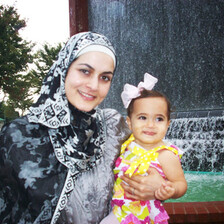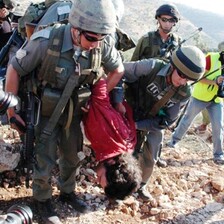Al Jazeera 17 July 2005

After a bloody day that saw 10 Palestinians killed, the fragile five-month Israeli-Palestinian truce seems to be in danger of unraveling. But analysts on both sides say this is simply a game of chicken weeks before Israel’s planned Gaza disengagement.
On Friday, Israeli helicopter gunships killed six Hamas members in Gaza and the West Bank a day after a barrage of Qassam rockets on illegal settlements killed an Israeli woman. Later, another Hamas member was killed. Palestinian street-fighting on Friday claimed the lives of three children, after Palestinian security forces shot at a car with Hamas fighters who refused to stop at a local checkpoint. Within 24 hours, the situation seemed to have reverted to the height of the Intifada.
The Gaza Strip has been split into three sections by the Israeli army. Rafah crossing, an official told Aljazeera.net, again has been sealed off to Palestinian males between the ages of 16 and 35. And tanks are massing near Jabaliya, preparing for a major Gaza offensive.
Hamas, in funeral processions throughout Gaza city on Saturday, vowed revenge in the form of more Qassam rockets.
Testing the truce
But analysts say the violence is only intended to test the limits of the fragile truce. Sharon does not want to be seen as evacuating under fire, and Palestinian factions want the disengagement to appear as a victory.
In the end, analysts say, it is in neither side’s interest to officially abandon the ceasefire before disengagement. “All of this is pretty vague - the ceasefire. The calmness exists. It’s not an even, simple ceasefire, like North Korea and the United Nations,” said Ira Sharkansky, professor of political science in Jerusalem’s Hebrew University.
“We recognize that Palestine is a very complicated situation, with parties that comply and some that don’t. Israel is always making a calculation whether it’s worth doing something in response that will make things worse, or worth absorbing some problems in order to keep the process going. It’s a continuing cost-benefit analysis,” he added.
“Both sides are pushing it to the very edge. Israel’s mass of forces will not lightly decide to go in; we don’t want our troops exposed to danger; we don’t want to end the hope that Abbas can produce a responsible state. He’s the best hope we have, and we want to keep that alive,” said Sharkansky.
“But then, we don’t trust the Palestinians, and we don’t trust Abbas completely. But the rockets are still coming, and if another one lands too closely, they may go in.”
Exception
Ghazi Hamed, Palestinian analyst and editor of the Islamic weekly al-Risala, told Aljazeera.net that what transpired on the Palestinian-Israeli front was simply another exception to the rule. While a Gaza offensive seems unlikely, if it does occur, it will mean the end of the truce, he said.
“The Palestinian issue is not stable - there are many exceptions. This is something we have become accustomed to during the past few months. Neither the Palestinian nor the Israeli side want the ceasefire to be broken - they both want the disengagement to proceed smoothly,” Hamed said.
“I think the Israeli offensive is only a threat … if they do raid Gaza, the ceasefire will be over for sure. Gaza has a lot of security downsides … using air force is always preferable for Israel from a security standpoint.”
On the Palestinian front, factional infighting claimed the lives of three teenage boys, after drawn-out battles between security forces and Hamas activists in northern Gaza spread to the city’s streets. The incident is thought to reflect the lawlessness that has taken hold in Gaza, and, many fear, may foreshadow what is to come after disengagement.
No standard procedures
Hamed blames the absence of standard operating procedures and clearly defined red lines between Hamas and the Palestinian security forces, and predicts the situation will worsen after disengagement if the sources of the conflict are not addressed.
“The space that Hamas and the PA are functioning in needs to be defined. Hamas says it has a right to respond to Israeli infractions of the ceasefire, and the PA says it needs to act against the Hamas or it will become weak,” said Hamed.
“All this is resulting in a confusing situation. There is a lack of clarity as to the relationship between the two sides. I fear that after disengagement it will only become worse.”
The Palestinian Ministry of Interior insists that its mission is clear and that it will carry it out firmly. “The police and national security forces are security branches that merely implement the government’s policies. What the political leaders decide, we abide by,” said Tawfiq Abo Khosa, spokesperson for the Ministry of Interior.
“Our role is to maintain order. And we will, very clearly, enforce the law. Hamas is not above the law. They need to understand we are part of the Palestinian street, too,” Abo Khosa said.
Leila M. El-Haddad is a journalist based in the Gaza Strip. This article was originally published by aljazeera.net on July 16, 2005 and reprinted on EI permission.
Related Links





